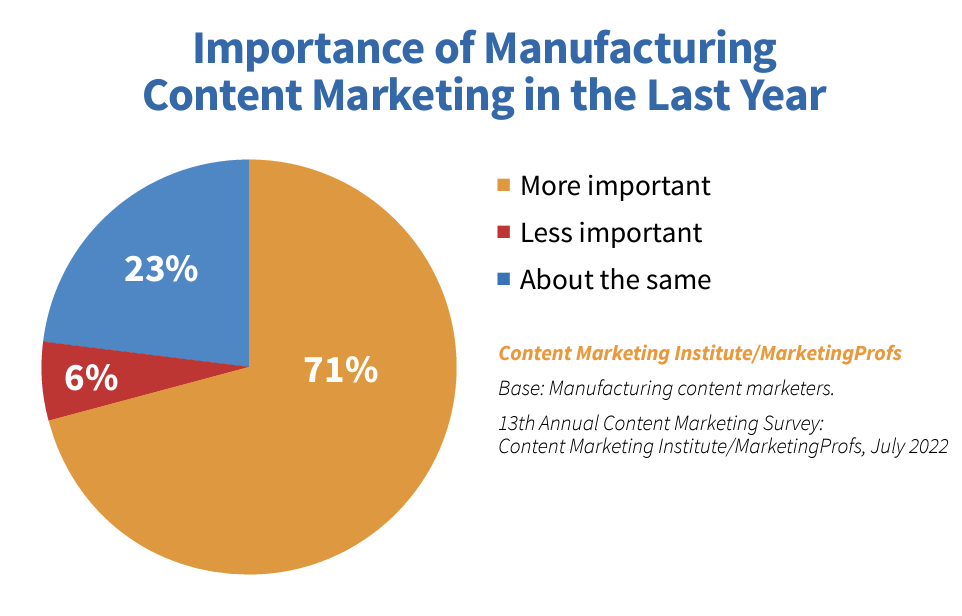Crafting Compelling Content: Content Marketing Guide for Manufacturers
07/19/24 | 8-minute read

For many industries, traditional marketing has taken a backseat to increasingly effective content marketing strategies. Instead of just promoting products and services, B2B companies are realizing the importance of creating useful, engaging content to connect with target audiences and encourage more sales. This is true for the manufacturing industry too—thoughtful content marketing for manufacturers can help attract and retain buyers, transform client experiences, and build a strong digital presence.
According to a 2023 study by the Content Marketing Institute, 71% of manufacturing marketers believe content marketing has become more significant over the last year. This trend aligns with the fact that 64% of all B2B buyers now belong to the millennial and Gen Z generations. These younger, savvier, and highly informed customers demand more—not just innovative products and services but also personalized experiences, in-depth information, and customized solutions before making decisions.
Unfortunately, in the same Content Marketing Institute study, only 25% of manufacturing marketers felt that their content marketing strategies were “successful or very successful”. The real question is what makes a content marketing strategy for manufacturers effective?
If you’re a manufacturing marketer, you’re in the right place. We’ve created this blog to help you create a marketing strategy and B2B manufacturing content that truly resonates with your audience. Let’s turn your content marketing efforts into real results.
Why Content Marketing Strategy for Manufacturers is Essential
Content marketing is a game-changer for the manufacturing industry. Unlike most B2C marketing, which features flashy ads and quick consumer engagement, content marketing for manufacturers focuses on providing in-depth, relevant information to a more specialized audience: businesses and industry professionals. This demographic values detailed, technically accurate, and highly relevant content, making content marketing a vital tool for success in this field.
As a manufacturer, your company sits at the heart of the supply chain, dealing with complex processes, technological innovations, and detailed industry insights. Therefore, your content marketing strategies must reflect this complexity.
Your marketing won’t be about selling quickly; it’s about educating, informing, and building lasting relationships based on trust and authority. Effective content marketing can help you communicate the intricacies of your operations, showcase your expertise, and provide valuable insights into industry trends and technologies.
To start making a potent content marketing strategy as a manufacturer, you must:
- Understand your audience
- Demonstrate technical knowledge and expertise
- Maintain relevance
- Be consistent to stay top-of-mind
- Integrate content elements with other aspects of your overall digital marketing strategy
Benefits of Content Marketing for Manufacturers
Now that you know more about why it’s crucial for manufacturers to use content marketing as part of their marketing efforts, let’s look at what you’ll gain if you’re effective.
Successful content marketing strategies will:
Drive Website Engagement and Traffic
Quality content that answers prospects’ questions and addresses their needs can significantly increase website traffic and engagement. The more traffic your website gets to relevant content, the more inquiries and solid leads.
Increase Brand Awareness
Do you consistently publish high-quality content that is valuable and helpful to your audience? If so, it will help enhance your brand awareness and recognition. People will know your brand and associate it with helpful information.
Establish Industry Authority
As we mentioned, publishing meaningful content (and doing so regularly) will build brand awareness and also industry authority. Your company will build a reputation as a trusted industry resource, leading to higher search engine rankings and increased referrals.
Improve SEO Rankings
Content marketing helps improve search engine rankings by using relevant keywords, internal and external links, and optimized images. Your content means that it’s easier for potential customers to find you online.

Build Contact Lists
High-quality content can drive conversions by encouraging prospects to download resources, sign up for newsletters, and share content. If you create content that your audience is interested in, it will help you grow your contact list with potentially warm prospects.
Encourage Buyer Engagement and Open Dialogue
Content marketing fosters long-term relationships by encouraging engagement through social media, emails, and blog posts. This open stream of communication will help you understand your audience better and refine your content strategy.
Help Generate Ideas for Future Content
This may sound strange, but making content can help you with future content creation as well. Listening to feedback or questions your audience has can give you valuable insights when creating upcoming content, ensuring you can keep content relevant and engaging.
So, instead of getting stuck and not releasing content until it is “perfect,” go with what you have so far and continue refining it based on your audience’s reactions!
Common Challenges in B2B Manufacturing Content Marketing
Despite the benefits of content marketing for manufacturers, manufacturing companies face several challenges in content marketing, including:
- Aligning sales and marketing teams
- Maintaining consistent messaging
- Measuring performance, including attributing revenue to content marketing efforts
- Differentiating a company and its products or services in a highly competitive industry
These challenges can be overcome by adopting a tailored strategy, fostering collaboration between departments, and using data analytics to track performance and optimize strategies.

How To Develop Your Content Marketing Strategy
Step 1: Set Clear Goals & Objectives
Define clear goals for your content marketing effort, such as increasing brand awareness, generating leads, or boosting sales. Furthermore, each goal should be developed to be SMART: specific, measurable, achievable, relevant, and time-bound.
Step 2: Build a Strategy Tailored to the Manufacturing Industry
Once you know your goals, you need to ask yourself how you want to achieve them. The most important part is to know your target audience. Analyze them and create detailed buyer personas so that the campaigns you develop resonate with the right audience, in turn, driving higher engagement.
You know your industry the best. Create relevant content, such as white papers, case studies, and instructional videos, that addresses the unique needs and challenges of the manufacturing sector.
Step 3: Organize Yourself with an Editorial Calendar
Before diving into content creation, it’s crucial to get organized. Start by ideating, planning, and scheduling your content pieces in advance using an editorial calendar. Numerous tools can help you build an effective editorial calendar. Options range from free tools like Google Sheets to more feature-rich solutions like Asana or ClickUp, which come with a small cost.
Having a clear plan and schedule ensures consistent content creation that aligns with your overall marketing objectives and goals. Plus, knowing what needs to be done in advance makes it easier to stay on track and manage your content strategy effectively.
Step 4: Create High-Quality Content
Focus on creating educational, informative content that provides value to your audience. Use visual content like videos, infographics, and images to explain complex topics clearly and engagingly.
Step 5: Optimize Your Content for Search Engines
While creating valuable content itself is helpful, integrating proper SEO into these content pieces makes them even more effective. Ensuring your content follows SEO best practices will help improve your content’s visibility in search engine results. This means when people search for a topic, your content is more likely to come up in the search results.
Relevant keywords, internal links, and high-quality backlinks from industry websites are some key SEO elements to consider when creating content.
Top Types of Content Marketing Elements for the Manufacturing Industry
Depending on your resources, industry, and area of expertise, the types of content you create can significantly impact the success of your content marketing strategy. While some content types might resonate better with B2C audiences, such as providing engaging and relatable experiences, others can be more effective for B2B marketers, like providing in-depth insights.
Understanding which types of content will best serve your target audience is crucial for maximizing your marketing efforts.
- White Papers: Deep-dive reports that establish your authority on industry topics (often accessed by giving the company their email).
- Infographics: Visual representations of complex data, making it easy to digest for the audience..
- Blog Posts: Share industry insights, trends, and best practices.
- Social Media Marketing: Engage with your audience and share behind-the-scenes content.
- Email Marketing: Keep your audience informed with regular newsletters.
- Video Marketing: Showcase products and expertise through instructional videos.
- Case Studies: Highlight successful projects and real-world applications.
- Webinars: Host interactive sessions on industry-related topics.

Reimagine Your B2B Manufacturing Content Marketing Efforts
Content marketing can revolutionize how your manufacturing company connects with buyers. By developing a customized strategy and leveraging various content types, you can drive engagement, increase brand awareness, and achieve your marketing goals.
Ready to transform your manufacturing company’s content marketing strategy? If you want to focus on your strengths, you can partner with an experienced digital marketing agency to execute a comprehensive content marketing strategy. Connect with Ballistic Arts today—we’re a skilled digital marketing agency that specializes in getting high quality leads for B2B businesses.


